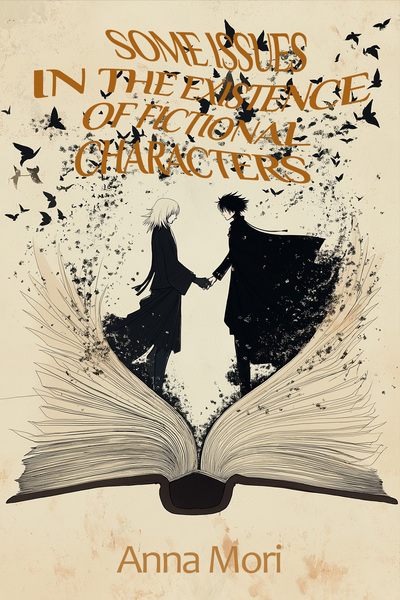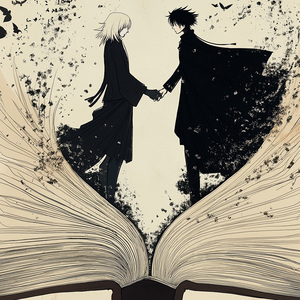Recognizing the truth in the young man’s words, Ryuzaki suppressed his fury and lowered his bow. When Yoshifusa rode up to him, he listened carefully to his plea and at last gave his solemn word that he would judge Lady Ageha fairly. The defeated lord was taken into custody to await his fate.
That night, Ryuzaki sat long in thought. Had he not been cruel enough? No matter what he decided, he could not change fate — he could not bring back the late emperor, nor the prince so treacherously slain. Would it truly serve justice to behead this wretched girl, who, in truth, was no criminal at heart? Was she not, like so many daughters of noble houses, merely a pawn in the hands of her ambitious kin?
Perhaps, then, the wiser course was to spare her — against all custom, to grant her life. The people would see his mercy, and perhaps, in time, even they would judge it the right thing to do.
But such is the way of this fleeting world — nothing here unfolds by our will alone. Just as cloth dyed with “moon herb” changes color with ease, so too does life lack constancy: all is transient, and no one can tell who will descend into the grave first — the aged or the young maiden.
On the second night of Lord Yoshifusa’s imprisonment, Lady Ageha, knowing nothing of her father’s capture, resolved firmly to take her own life by throwing herself into the well within the courtyard where she was held. When the maid assigned to watch over her briefly succumbed to sleep, Lady Ageha rose quietly from her bedding and stepped outside. Turning her face westward, she whispered a prayer, asking only that the Buddha grant peace to her tormented soul in the next life. Then, with tears streaming down her cheeks, she cast herself into the depths.
The samurai guarding the Willow Manor heard the splash of her body hitting the water, and they soon pulled her out. But alas, their efforts to revive her were in vain. Her skin was pale and cold, water dripped from her white robes, and her head — shorn of its once-flowing hair — drooped lifelessly, resembling a wilted chrysanthemum.
Meanwhile, her father, Lord Yoshifusa, waited with quiet resignation for his execution. Day after day passed, yet he bore his imprisonment with unshaken resolve, praying only that his daughter was safe. But such hopes were in vain.
When Ryuzaki came to see him for their final conversation, Lord Yoshifusa asked but one question:
“How fares my Ageha?”
Ryuzaki’s heart wavered. Struggling to maintain his composure, he replied,
“I have decided to release Lady Ageha.”
He did not speak of how, three days prior, she had drowned herself in the well.
“You have my deepest gratitude, Kuro Ryuzaki!” Yoshifusa exclaimed. “They say you are severe, yet just — and now I see it is true! Let my head fall from my shoulders, but I shall die content, knowing my daughter yet lives. For the gods gave me no children but her. If ever I have committed evil in this life, I shall suffer punishment in the next, yet the heavens know — I did it all for her sake.”
And as he spoke, he wept.
The following day, the execution took place. Lord Yoshifusa knelt, facing west, and began to recite his prayers. The executioner stepped behind him, raising his blade. Yet as Yoshifusa murmured the sacred sutras, a thought pierced his mind like an arrow:
“Was I a fool to place my trust in this ruthless man? He has brought endless suffering upon my daughter — was it not Ryuzaki’s doing that robbed her of her child? Perhaps she still languishes in confinement, waiting for me to rescue her, unaware that my final hour is upon me…”
The thought unsettled him so deeply that he broke off his prayer and, with sudden urgency, asked,
“Tell me the truth — is Ageha truly safe?”
In the next instant, the sword fell, and his head rolled to the ground.
A tragic sight indeed. Though Lord Yoshifusa had committed countless misdeeds, his love for his daughter had been sincere, and even Ryuzaki himself, along with all who witnessed the execution, could not hold back their tears.
On the twenty-third day of the Ninth Month, officials of the Bureau of Investigations paraded Yoshifusa’s severed head through the great avenues of the capital before displaying it upon a tree near the prison gates. Never before had a noble of such high rank suffered such disgrace. And only a few moons prior, who could have imagined that the head of the Morinaga clan itself would meet such an ignoble fate?
As great as the dishonor visited upon Yoshifusa after death, so too was the shame borne by those who still dared to support the Morinaga name. The crime of Lady Ageha had become the talk of the entire land, and from the highest courtier to the humblest peasant, all spoke of the Morinaga as poisoners.
Makishima Shougo’s heart was heavy with dread in these turbulent days. The war raged on, yet half of his vassals and former allies had abandoned him, while the other half had turned outright against him.
Among his remaining forces was a certain Masahiro Iwata, who roused the soldiers with bitter words:
“I look at the state of this country, and my heart burns with anger and grief! We all swore loyalty to the Morinaga, but they proved to be nothing but traitors and poisoners. Because of them, our beloved sovereign is dead, and the capital — nay, the entire land — lies in ruin! And tell me, for whose sake do we still fight? The woman and the child for whom this war began are both gone, and yet we continue to spill blood in their name. Is this not a wretched fate?
“And if you still believe our loyalty will be rewarded with land and rank, cast aside such foolish hopes! Look at what became of poor Lord Yoshifusa — what reward did he receive for his service?
“How much longer shall we obey Makishima Shogo, kinsman to the poisoner? How can we trust that he himself was not complicit in the plot against our emperor? Why does such a man still command this army? He, like the condemned Lord Yoshifusa, will offer us no reward for our service. He can barely afford to pay our wages as it is!”
“This is nothing but the truth!” the samurai murmured in agreement. “But even if we turn to Kuro Ryuzaki’s side, will he ever trust us? After all, until this day, we have fought under the Morinaga banner…”
“Let us prove our sincerity by striking down Makishima Shogo!” declared Masahiro Iwata. “We must seize him, take him prisoner, and deliver him to Kuro Ryuzaki!”
Agreeing that this was the best course of action, the warriors turned against Makishima.
Seeing his own vassals rise against him, Makishima shouted in fury:
“So be it! If that is your wish, I shall ride to Ryuzaki of my own free will! And with my own hands, I will slay that wretched man — the one responsible for my uncle Yoshifusa’s death and for the loss of my beloved sister! And if I fail, then at least I shall die a glorious death!”
With only a scant two thousand loyal warriors remaining at his side, Makishima galloped toward Ryuzaki’s camp.
Meanwhile, the western army fared no better. Discontent had long simmered among the troops, for with the city gates blocked by Makishima’s forces, supplies had all but ceased, and the soldiers were starving. Now, however, their murmurs grew louder, fueled by troubling rumors.
Those who had retrieved Lady Ageha’s body from the well and seen the wounds upon it, as well as those who later attended her burial, spread whispers of the terrible torment she had endured. Soon, many openly condemned Kuro Ryuzaki, head of the Bureau of Investigations, calling him a ruthless monster. Some even dared to claim that the Morinaga family had been falsely accused of poisoning the emperor, and that Lord Yoshifusa’s execution had been unjust. No one knew what to believe anymore.
By then, word had also reached the capital that assassins had been sent to kill Prince Akimitsu in his monastery. Though it was clear to all that the Morinaga clan was behind the attack, the prince’s death cast yet another shadow upon Ryuzaki. People remembered that he had been Akimitsu’s foster brother and whispered among themselves:
“The prince loved him dearly, yet he failed to protect his lord — or even die by his side!”
And so, when news spread that Makishima was riding straight for the western camp with the intent to kill Ryuzaki, many samurai gave strict orders that their men should not interfere. Thus, despite the small size of his force, Makishima was able to break through and reach Ryuzaki’s headquarters.
At that moment, Kuro Ryuzaki was clad in armor but unprepared for battle, seated on a small folding stool. Makishima struck at him with his long sword, delivering blow after blow. Though Ryuzaki’s personal guards formed a wall of spears around their lord, Makishima managed to land several grievous wounds upon him.
One of Ryuzaki’s bodyguards lunged at Makishima with his spear, but the tip glanced off the armor and instead struck his horse. Maddened by pain, the beast reared violently, throwing its rider to the ground.
A terrible fate befell him — Makishima’s spine snapped upon impact. Unable to rise, he writhed in agony, overwhelmed by unbearable pain.
Though gravely wounded himself, Ryuzaki found the strength to approach his fallen foe.
“How do you feel?” he asked.
“I am dying…” Makishima whispered, his voice fading.
“Do you have any last wishes?”
“What is there left to wish for…?” Makishima sighed. “Only one thing grieves me — that I shall never see you die.”
Ryuzaki remained composed. “Your strikes were not in vain,” he said. “Some of them found their mark. My own time will come soon enough. But I bear you no hatred. If you wish, I could end your suffering now — by taking your head.”
The pain was too great for Makishima to refuse.
At that moment, the mournful cry of a cuckoo echoed through the sky. A sudden thought struck Makishima — could it be that his beloved sister Ageha, after death, had become a cuckoo, like the soul of the legendary Emperor Shu-di, lamenting her earthly life? He recalled his last meeting with Lady Ageha and regretted how cold he had been toward her. But how could he have known that within days, she would truly take her own life? After all, the vows of women were seldom taken seriously…
And so, he spoke his final poem — melancholy and beautiful:
I hear your sorrow,
from the heights where no one treads,
forest cuckoo’s cry…
Like me, do you also grieve
for what is lost, gone forever?
Such were his last words before death. Not every man can compose verse in his final moments.
And Kuro Ryuzaki, in turn, offered his own reply:
So you mourn, cuckoo,
for the cherry blossoms shed
before their time?
Then let us count together
who has wept more tears.
And taking a sword from one of his vassals, he struck off Makishima’s head.
Then he said:
“It is time for me to end my own life.”
He drew a treasured dagger with a sandalwood hilt — the very one gifted to him by Prince Akimitsu. Since childhood, Ryuzaki had never parted with it, always keeping it tucked into his sash. He placed the dagger’s tip against his stomach and lunged forward so swiftly that the blade pierced through his body and emerged from his back. With that, Kuro Ryuzaki breathed his last.
Thus perished the instigators of this war, the leaders of the eastern and western armies. But by then, it was not only the capital that lay bleeding, torn in two by their struggle — the entire country was in turmoil. Battles raged far beyond the capital’s borders, and when word spread that the throne had been left without an heir, civil war did not subside; instead, it engulfed the land like wildfire.
Lords and landowners seized the moment to settle old grudges. Bandits roamed unchecked, preying upon the weak. Peasants and low-born samurai rose in rebellion. The wealthiest nobles, fancying themselves sovereign rulers of their own domains, issued laws and edicts for their heirs — an audacity unheard of in times past! — and waged endless war against one another. There was not a single home untouched by the storm of suffering, whether it was a noble’s jade-adorned hall or a peasant’s hut woven from branches. And though all those who had set this war in motion had long since perished, the conflict continued, tearing lovers apart and stealing children from their parents.
Oh, sorrow!..
…In his final moments, Makishima glimpsed a memory of his previous death — only to forget it the next instant. The recollection was sharp and searing, like a flash of lightning.
Then the world faded into darkness.
But as it turned out — not forever.
***
After the samurai epic, they didn’t speak for two days.
Then Makishima swallowed his pride and baked pastries.
For a while, he hesitated at the door to L’s room — it wasn’t fully closed, so knocking would have been strange. Finally, deciding that L was well aware of his presence, he asked:
"Are you busy?"
"Yes," L replied without looking up from his book. (Incredible, Makishima thought. Had that whole story actually sparked a love of reading in him?)
"I want to talk. To apologize," he clarified.
"Go ahead," L allowed.
Makishima stepped inside and silently held out a plate. (His conclusion about the books had been premature and entirely incorrect — the one L was reading turned out to be the same old children's manga about Doraemon.)
"Is this a bribe?" L asked shrewdly at the sight of the pastries. Still, unable to resist temptation, he picked up one of these multi-layered, colorful, cream-adorned masterpieces of Rococo-style architecture and took a careful bite.
"These are real French choux pastries. Did you make them yourself?" he asked.
"No, I ordered them from a food delivery service," Makishima snapped.
"Wait, do we even have—" L started (sometimes sarcasm went right over his head). But, thank god, he caught on and shut up.
Before Makishima managed to create anything edible, he had ruined two baking trays, gone through an entire bag of flour, two packs of butter, and a considerable length of his own nerves. But in the end, even Marie Antoinette herself would have approved.
L was devouring the pastries with such shameless pleasure that Makishima reached for one himself — only to meet L’s outraged glare and promptly retract his hand: fine, fine, I won’t touch anything, stuff your face, you parasite.
By the fourth pastry, L finally softened and said,
"Alright, let’s have some tea, then."











Comments (0)
See all